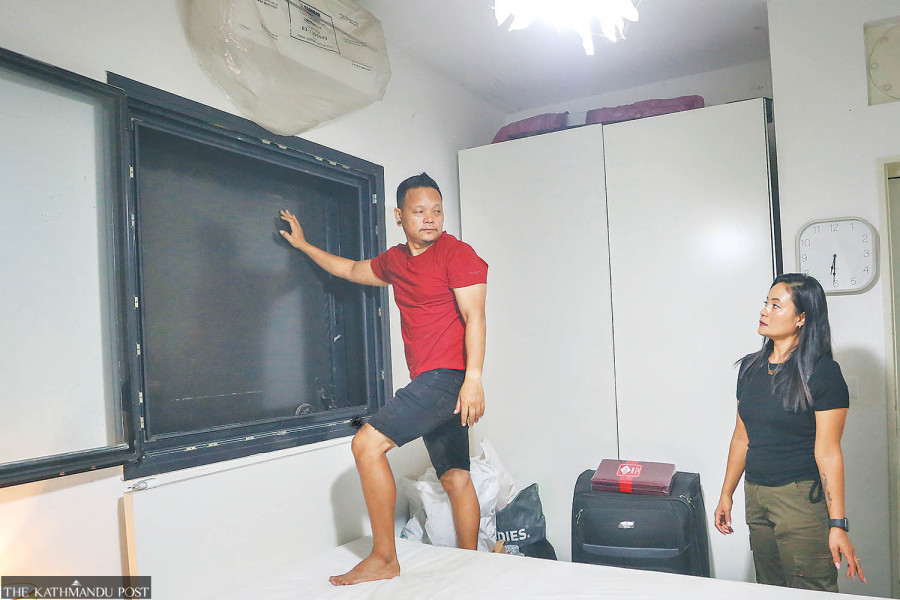National
Amid war, many Nepalis in Israel say they feel safe enough
Their resolve to stay is backed by solid income and the trust they have in the country’s missile defence system.
Hom Karki
Since the militant group Hamas launched an unprecedented attack on Israel, breaching the Gaza border in a coordinated ground and rocket strike on October 7, explosive projectiles continue to be fired into Israel from both the Palestinian enclave and the Hezbollah-controlled areas of Lebanon.
Showing pictures by the Associated Press, Times of Israel reported that Israel on Thursday fended off rocket strikes from the two territories. The rockets were said to have been launched in retaliation for Israel’s air strikes targeting militant facilities.
Foreigners, including hundreds of Nepalis, living in the war zone are caught in a crossfire. Ten Nepali students were confirmed killed in the surprise attack from the Gaza Strip in the first few days and Israeli authorities are preparing to send at least four bodies to Nepal. The victims whose mortal remains are being sent home are Dipesh Raj Bista, Narayan Prasad Neupane, Lokendra Singh Dhami and Ashish Chaudhary. Nepali diplomats in Israel say the flight for repatriating the bodies has yet to be confirmed. The Israeli government will bear the cost of flying the bodies to Nepal.
The Nepal government conducted an evacuation flight bringing home 254 Nepalis last week. On a flight arranged by the Indian government, 19 more Nepalis left the war-hit country on Tuesday.
Meanwhile, more Nepalis, numbering in thousands, who have been in the country for jobs or study told the Post correspondent in Israel that they do not plan to return to Nepal immediately.
Not a day passes by without Dhan Bahadur Dewan of Jhapa witnessing rockets streaking across the skies of Kiryat Gat in southern Israel. The Palestinian militant group Hamas has been almost regularly launching rocket attacks on Kiryat Gat near the Gaza Strip. On a recent day, a rocket shrapnel fell on the house where Dewan stays.
“When I saw rockets for the first time, I was very frightened. But now it has become a familiar ordeal for the people like us living near the Israel-Palestine border,” Dewan shared.
On Tuesday alone, the Hamas militants launched scores of rockets from dawn to dusk targeting the southern Israeli cities and towns including Negev, Shephalah, Lakhish, among other areas. “The rockets flying in the sky are not quite threatening because most of them are destroyed mid-air by the Israeli missile defence system known as Iron Dome. But rocket shrapnel falls almost every hour in southern Israel,” said Dewan.
But despite the heightened tension, Nepalis living in Israel for the past few years don’t seem particularly concerned as they appear confident that the missile defence system will destroy the rockets in the sky.
“The ongoing war is on a massive scale, but it is happening far away from Tel Aviv. So, for the Tel Aviv residents, it is not a big concern,” said Prakash Limbu of Morang, who has been working in Israel as a caregiver for a decade. “We don’t have much to worry as Hamas rockets are destroyed before reaching their targets,” he added.
But on October 7, Israel suffered huge losses of life and property after the Iron Dome system failed to intercept Hamas rockets. Israeli Prime Minister Benjamin Netanyahu publicly acknowledged an intelligence failure that caused the losses on October 7.
A total of around 1,400 people including 10 Nepali students were killed in the assaults. Varying media reports say more than 4,000 Palestinians have already died in Israel's retaliatory attacks.
The Nepali students had reached the West Asian country under the ‘Learn and Earn Programme’ from Sudurpaschim Province. According to the Nepali Embassy in Israel, one of them, Bipin Joshi, is still missing following the attack while five others were injured. One of the injured has already returned to Nepal while another has been discharged from the hospital and is currently taking rest at the Nepali embassy in Tel Aviv.
According to government authorities of Nepal, there are around 4,500 caregivers— males and females—currently working in Israel. Officials say there are no other Nepalis working in the agricultural sector in Israel except those students.
Nepalis mostly work in Tel Aviv, Haifa, Netanya, Ramat Gan, Rishon, Ramle, Nazareth and Hod Hasharon, all of which are relatively safer places in Israel.
“We two Nepalis work as caregivers for a debilitated man. We have to take care of him round the clock,” said Jiban Dhakal of Jhapa who has been working in Israel since 2014. “Life here is almost normal and the situation is not so scary. Whenever the siren wails, we rush to the bunker.”
Dhakal does not have a plan to leave Israel immediately. “Here people respect work. The minimum monthly salary is 4,500 shekels (Rs148,353). One can earn an additional 380 shekels by working on holidays. I don’t think we have to return home anytime soon as we don’t need to venture out,” he said.
But back home, fearing the deadly attacks, the family members and relatives of the workers want to see them return to Nepal as soon as possible. “There is no such threat as the enemy rockets get destroyed before they could land. Family members pressure us to return home, but we have no plans to leave Israel immediately,” Dhakal said.
According to the Nepali embassy in Israel, a total of 639 Nepali people initially filled up forms to return home. Of them, 272 have already returned to Nepal. “Most people who earlier filled up the forms are now saying they don’t want to return home anytime soon,” said Kanta Rizal, the Nepali ambassador to Israel. According to her, just 61 Nepali people are in contact with the embassy and wish to return home.




 20.16°C Kathmandu
20.16°C Kathmandu













